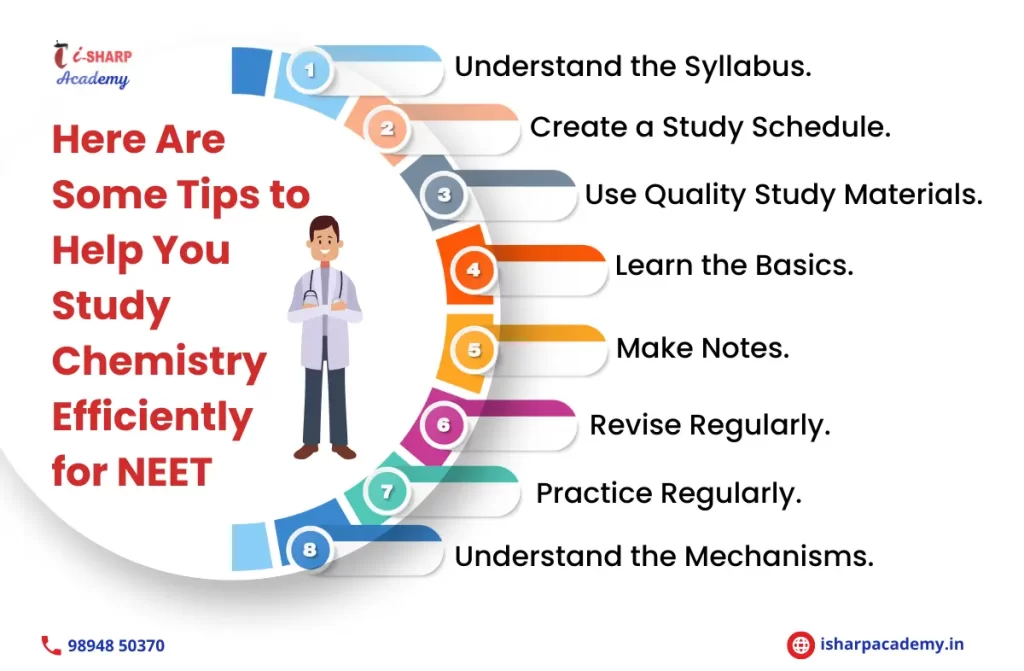Studying Chemistry for the NEET exam can be a daunting task, especially considering its importance in the overall score. However, if you consider how to study Chemistry for NEET, understanding the right approach and strategies can help you learn the subject effectively besides improving your performance significantly.
In this blog, we will guide you through essential tips on how to improve Chemistry for NEET and how to improve your Chemistry skills to excel in the exam.

Create a Structured Plan on how to study chemistry for neet
A well-organized study plan is much required for effective preparation. Allocate specific time slots for each topic, focusing on both theoretical concepts and practical applications. Include regular revisions to reinforce your learning. By following a structured approach, you’ll cover all the necessary topics without feeling overwhelmed.
Understand the Syllabus and Exam Pattern
Thoroughly go through the NEET Chemistry syllabus and exam pattern. Identify the weightage given to different concepts or topics and allocate your time for study accordingly. This will help you know how to study Chemistry for NEET by prioritizing subjects and concepts that carry more marks, ensuring you make the most of your preparation.
Utilize Quality Study Resources
Choose your study resources wisely. Invest in good quality textbooks, reference materials, and online resources that are specifically designed for NEET preparation. These resources often provide comprehensive explanations, practice questions, and mock tests that mimic the actual exam environment.
Focus on Fundamentals
Chemistry is built upon fundamental concepts. Before diving into complex topics, ensure you have a strong grasp of the foundational principles. This will make it easier to understand advanced concepts and solve intricate problems when you have a thought on how to study Chemistry for NEET.
Practice Regularly
Practice is key to mastering Chemistry. Solve a variety of problems, from basic to challenging, to improve your problem-solving skills. This will also help you understand the different ways questions on how to improve Chemistry for NEET. Consider solving previous year’s question papers to get a sense of the exam’s difficulty level.
Make Use of Visual Aids
While considering how to study Chemistry for NEET, you should be cautious that Chemistry involves visualizing molecular structures, reactions, and concepts. Use diagrams, charts, and models to aid your understanding. Visual aids can simplify complex topics and make them more memorable.
Conceptual Clarity over Rote Learning
NEET doesn’t just test your memory; it evaluates your understanding of concepts. Focus on understanding the ‘why’ and ‘how’ behind each concept rather than memorizing facts. This approach will not only help you in the exam but also in your future studies and career.
Group Study and Peer Discussions
Engaging in group study sessions or discussing topics with peers for how to study Chemistry for NEET can offer fresh perspectives and insights. Explaining concepts to others solidifies your understanding, and you might learn something new from your study buddies as well.
Seek Professional Guidance
If you find certain topics challenging, don’t hesitate to seek guidance from teachers, mentors, or online tutors. They can provide personalized explanations and strategies to tackle difficult concepts.
Time Management
Time management is crucial during the NEET exam. Practice solving questions with proper time management to improve your speed and accuracy. This will help you complete the paper on time and avoid leaving questions unanswered especially when you are clueless on how to study Chemistry for NEET.
Regular Revision
Frequent revision is essential to retain what you’ve learned. Set time for revision in your study plan. Reviewing previously studied topics helps reinforce your memory and ensures that you don’t forget crucial information during the exam.
Stay Positive and Take Breaks
Maintain a positive mindset throughout your preparation journey on how to improve Chemistry for NEET. Break your study sessions into manageable chunks and take short breaks to relax and recharge. Overburdening yourself can lead to burnout, so self-care is essential.
Conclusion
To conclude, excelling in how to study Chemistry for NEET requires a strategic and holistic approach. By following a structured study plan, understanding the syllabus, practicing consistently, and focusing on conceptual understanding, you can improve your Chemistry skills significantly. Remember to manage your time effectively by implementing these tips and techniques, you’ll be well-prepared to tackle the Chemistry section of the NEET exam with confidence.






